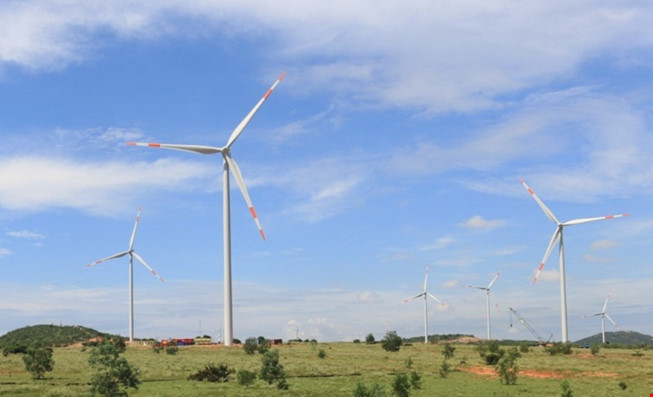A lot of difficulties to be coped with
Up to 8.6% of Vietnam territory is assessed to have good and very good potential for developing large scale wind farms. The total wind power potential in Vietnam is projected at 513,360 MW, i.e. more than 200 times as much as the capacity of Son La hydropower plant (this figure includes offshore, onshore and continental shelf winds).

Vietnam is a country owning big potential for renewable energy
According to an evaluation made by the World Bank, the solar energy potential of Vietnam is situated mainly in the South Central coastal provinces from Khanh Hoa to Ba Rịa - Vung Tau and Central Highlands provinces where solar radiation intensity is from 5.2 – 5.7 kWh/m2. In addition to two above-mentioned renewable energy sources, Vietnam has other sources such as biomass energy, renewable energy from waste, geothermal energy, etc.
According to Vietnam Electricity (EVN), the current legal document framework governing investment activities of the country is principally adequate. The Renewable Energy Development Strategy of Vietnam up to 2030 with vision to 2050 has been passed by the Prime Minister since 2015. Furthermore, policies and mechanisms to support and motivate wind power and solar power projects have been already approved by the Prime Minister.
However, renewable energy development master plans (except for small hydropower) have been prepared for only potential scale in each zone, region, but not specified project locations, which hence causes difficulties in planning and developing the power network synchronously.
With intermittent and unstable operational availabilities, wind power and solar power sources change generation capacity according to wind strength and solar radiation intensity, consequently when developing renewable energy in large capacity scale, back-up generation sources will be needed as well as solutions for operating the power system safely and reliably should be in place; technical standards of equipment to be installed in generation and transmission of electricity from renewable energy sources; regulations on audit and verification of equipment before being installed, etc. are not available yet. Land acquisition, compensation and resettlement are commonly occurred problems when implement projects in general and renewable energy projects in particular.
Incentive policies on taxes and land should be made available
According Doctor Doan Van Binh, Director of Institute of Energy Science under Vietnam Academy of Science and Technology, in reality the investment cost per kW of wind power currently is about USD 2,370, the production cost of wind power thus is between 10 and 12 UScent / kWh subject to installation conditions.
The investment cost per kWh of solar power is gradually decreasing down to nearly its half during the 4 to 5 recent years, from 3,500 - 4,000 USD down to only 1,770 USD – 2,200 USD subject to installation conditions. However the production cost of solar energy keeps to be around 10 and 12 UScent / kWh. Obviously with such production costs, renewable energy sources face difficulties in competing with other conventional generation sources like coal fired thermal power generation or hydropower whose production costs are just a half. As a result, without appropriate policies and mechanisms, the competitiveness of renewable energy sources is very low.
To overcome challenges in wind power and solar power development with the view to attracting local and foreign investors, EVN views that the competent authorities should complete and promulgate national codes and standards, technical standards relating to engineering and operation of renewable energy sources; create preferential policies on investment capital and taxes to enable institutional and individual renewable energy developers to access to concessionary financial resources and enjoy tax reduction or tax exemption according to the laws on tax; develop preferential policies on land acquisition and support in site clearance.
In particular, the Government shall consider and approve feed in tariff of biomass energy and revise feed in tariff of wind power; develop and issue regulations on auction scheme for renewable energy projects; establish development investment funds to financially support renewable energy development activities.